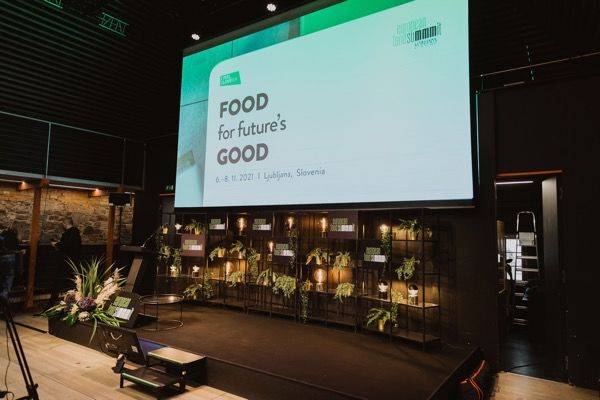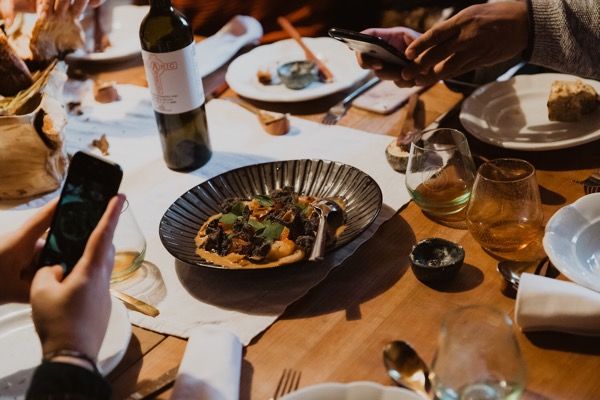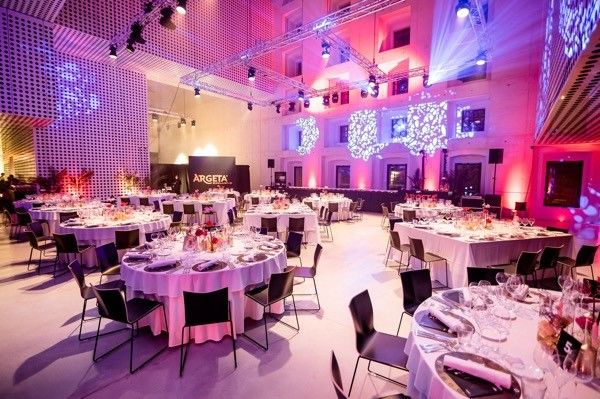- Media Centre
- Press releases
- The European Food Summit 2021 has come to an end: what are the conclusions?
The European Food Summit 2021 has come to an end: what are the conclusions?
The European Food Summit 2021 has come to an end: what are the conclusions?
As part of an unparalleled three-day event, the European Food Summit provided a fusion of gastronomy, culture, art and architecture. The symposium under the slogan "EVOKE UP!" was marked by renowned speakers from all over the world, who talked about the culture food and its importance.

Slovenia, a boutique country which has evolved into one of the most recognizable European destinations for top gastronomic experiences, last weekend hosted the European Food Summit, organized by the renowned catering company Jezeršek gostinstvo, in cooperation with the event's partners, the Slovenian Tourist Board and Ljubljana Tourism. Between the 6th and 8th November, the European Food Summit provided a series of unique culinary events which took place in Ljubljana and elsewhere in Slovenia.
The recipient of two Michelin stars and the seventh on the list of the world's best chefs, Ana Roš, who is also the co-creator of the event, believes that “The European Food Summit is an outstanding event connecting food – which is art – the culture, writing about food and thinking about the future of food.” According to her, sustainability and finding answers to the problems which arose during the period of lockdown nowadays play an important role in the culinary world, not only in Slovenia but also elsewhere in the world.
"The European Food Summit is wider than Slovenia and wider than the culinary world itself," was pointed out by Martin Jezeršek, the event organizer and general manager of Jezeršek gostinstvo, with whom Andrea Petrini, the most influential man in the culinary world, agrees: "I am convinced that we have something really important, which will also prove itself, as it is a Slovenian story. Small or micro-stories of Slovenian villages, which are important for others as well, can take a certain answer out into the world".
This time, unique stories were created by top domestic and foreign chefs, renowned speakers, media representatives and other outstanding individuals who co-created many accompanying culinary events at the European Food Summit under the common vision "FOOD for future’s GOOD!". At the opening Saturday culinary walk Gourmet Ljubljana Crawl, the top chefs of the JRE Slovenia Association served their stories in museums, galleries and other cultural sights of the city of Ljubljana, under the auspices of Tourism Ljubljana. Luka Košir (Grič, Michelin star), one of the most promising chefs of the younger generation, welcomed the participants at the Slovenian Tourist Information Center (STIC) and with a greeting from the kitchen sent them on a unique culinary journey. Guests were inspired by the appetizers of Marko Magajne (Galerija okusov, Plate Michelin) at the Dobra vaga gallery, and Jorg Zupan (Atelje, Michelin Star, and Breg), a chef with boundless imagination and the youngest two-time Michelin star recipient, at the Town Hall. Nature on a plate was served by Nina Čarman (Danilo – restaurant& wine, Plate Michelin) at the Natural History Museum of Slovenia. Jure Tomič (Ošterija Debeluh, Plate Michelin), who on the international scale is undoubtedly the most recognizable name of Posavje cuisine, greeted us into the world of illusions with his main course, taking the visitors of the House of Illusions to an unforgettable illusionist experience. Miha Dolinar (Mama Marija/Skipass) offered the riches of the cuisine from the kingdom of the Goldhorn on a plate to admire and taste at the Bankarium, the Slovenian Banking Museum. The dish of the talented young chef Leon Pintarič (Gostilna Rajh, BIB Gourmand) saw the light of day at certainly the most picturesque venue, the beautiful ambience of Ljubljana's Križanke, Peklensko dvorišče. At the end, the culinary path also took us to the green hill in the middle of the city, to Ljubljana Castle, where Jernej Bende (MaK Restaurant, Plate Michelin) was waiting for us behind the ancient castle walls with a special dessert.
Press trips to highlight the diversity of Slovenian gastronomy
At the invitation of the Slovenian Tourist Board, 24 invited journalists from the world's most influential media from as many as 15 different countries, such as Fallstaf, Corriere della Sera, La Repubblica, The Guardian, Forbes, The Telegraph and Fine Dining Lovers, were discovering the hidden corners of Slovenia and learned about culinary stories of inspiring world-class chefs and local producers on day trips I Feel Slovenia. In Slovenian Istria, Tomaž Bevčič (Rizibizi, Plate Michelin) presented Piran sea bass (Fonda sea bass), they visited the Lisjak oil-extraction plant (Matej Lisjak) and tasted their olive oils. In Styria, the biodynamic winemaker Aci Urbajc presented his philosophy of wine production and wild herb collecting, while Marko Pavčnik (Pavus, Plate Michelin), a specialist in "wild food", prepared delicious dishes from freshly picked herbs. In the heart of wine-growing Dolenjska region, at Gostilna Repovž (BIB Gourmand), the fifth-generation inn offered tasting of a truly traditional Slovenian lunch prepared in a modern way and served the typical Slovenian beef soup, concluding the dining experience at the Slapšak estate, where they process excellent sparkling wines Domaine Slapšak (Francois Botton). In the part of Slovenia most covered in forest, Ribnica, they were shown the production of organic salami Biosing (David Lesar), also from bear meat, where they enjoyed seasonally coloured dishes prepared by Boštjan Rakar (Gostilna Rakar). In Karst, at Gin brin (Erik Sarkič), the guests could choose their favourite blend from a multitude of recipes and cooked real Slovenian gin "One in a million" from Karst herbs, which they got to take with them. Chef Ksenija Krajšek Mahorčič (Gostilna Mahorčič, BIB Gourmand) impressed with the use of identical herbs with which she prepared dishes according to the recipe of traditional Karst cuisine. In Jezersko, they visited Tourist farm and camp Šenkova domačija (Polona Karničar), where they breed three autochthonous Slovenian breeds (Cika cattle, Krskopolje or Blackbelted pig and Lake-Solčava sheep), while Uroš Gorjanc (Gostilna Krištof, Plate Michelin) prepared an excellent alpine menu from the autumn crops of the eco farm.

Additional material about the providers included in Sunday press trips is available here.
On Sunday evening, in partnership with Tourism Ljubljana, a real culinary adventure took place in selected restaurants – the Ljubljana Soul Chefs, where Ljubljana chefs united their culinary souls and created unique and unforgettable dishes. Joined in culinary tandems top chefs created menus from local ingredients, accompanied by selected choice of wines which was taken care by Hiša dobrih vin - Koželj (the House of good wines); Jakob Pintar (TaBar, BIB Gourmand), the only Slovenian who managed to break through among the finalists of the prestigious San Pellegrino competition for the best young chef in the world, and Mojmir Šiftar (PEN KLUB), former captain of the youth culinary team and semi-finalist of the prestigious selection S. Pellegrino Young Chef 2018, at the Ljubljana restaurant PEN KLUB. Young chefs, Gregor Jelnikar (Monstera, Plate Michelin), under the mentorship of Bine Volčič, and Sebastjan Elbl (Gostilna na Gradu, BIB Gourmand), under the mentorship of Luka Jezeršek, created together at Gostilna na Gradu, while the extremely popular Igor Jagodic (Strelec, Plate Michelin) and the pioneer of modern Slovenian cuisine, Janez Bratovž (Restaurant JB, Plate Michelin), reigned at the JB Restaurant.
Monday's Symposium
What will be on our tables in the future was discussed by guest speakers at the Monday’s professional symposium. The European Food Summit served up an interesting selection of topics, whose main idea was to challenge the audience and decision-makers to consider the issues which the industry and our society as a whole will be facing in the next years and decades. The curator, Andrea Petrini, with the help of renowned Slovenian masterchef Ana Roš and organizer Martin Jezeršek, assembled a group of top-notch speakers from various fields of expertise, ranging from art critics to microbiologists. Beti Vidmar from the Biotechnical Faculty of Ljubljana introduced innovative ideas of reducing greenhouse emissions by simply changing the feed in beef production while maintaining the same quality of the end product. She challenged the idea of eliminating meat from the human diet as a solution to global warming, but rather proposed using science and understanding of the microbiome of the digestive tract of animals to reduce the greenhouse footprint of cattle farming. The other topic addressed was local and even hyper-local focus of restaurants. Chef Rebecca Clopath (Switzerland) took this idea to the extreme, eliminating all imported ingredients from her kitchen, including such basic ingredients as pepper. Though extreme in its foundation, she confirms that this is a sustainable practice, which, however, takes great dedication and adaptation to work. Marie-Claude Lortie (Le Droit, Canada) opened the eyes of Slovenian attendees at the event with her outside view of the co-op principles implemented in the Slovenian food chain in some parts of the world. She claims that the best supermarkets in the world are in fact farm co-op shops in rural areas, where the supply chain of food products is the shortest and that Slovenians are blessed with them being available in more and more places. The attendees also got the chance to see renowned chef Colombe Saint Piere (Chez St-Pierre, Canada) as an actor in a first-person documentary which explained the process of thought behind her radical decision to close her esteemed fine dining restaurant and shift to sustainable, hyper-local street food instead. Her vivid interpretation caused widespread approval in the audience, as did the eye-opening revelations of Parabere Forum's Maria Canabal (France) about how widespread the gender gap in the culinary scene still is. The pandemic time was also a good time for some self-reflection in the industry, which is why Fine Dining Lovers, the magazine for foodies by S. Pellegrino and Acqua Panna, performed an extensive survey to feel the beat of the industry. As explained by Hugo McCafferty, the challenges are obvious, with burnout being the number one worry. The corelation is obvious. The higher the position in the kitchen, the bigger the risk of burnout, and the longer folks have been working in the field, the bigger the worry they have.
In the second part of the conference, the attendees had the chance to hear first-hand what challenges food producers are facing, not only as a result of the pandemic, but as a result of years of pressure on product pricing. Nevertheless, a good example of how producers, chefs and even supermarket chains can come together to help one another was also shared. Andraž Tuš (Engrotuš) shared their story of working with Ana Roš in bringing a dedicated local line of products to the market, and the path towards convincing the consumers that it is worth spending a little more for quality products. It was Ana Roš who also hosted the round table focusing specifically on food producers, exposing their struggle to survive. Irena Orešnik (Sirarstvo Orešnik), one of Slovenia's most renowned cheesemakers, explained that there is no chance her medium-sized farm could survive without her having a second job, while Mitja Zupan from the Zupan fish farm pointed out that Slovenia, while a country with an abundance of fresh waters, imports half of its trout from abroad, with fish farmers facing significant administrative barriers when trying to expand their business. The attendees also got a chance to hear first-hand a story of a couple, Jeanne Dumas Chalifour and Matteo Monterumis, who took on extreme biodynamic gardening in the hills of Slovenia, where they created a unique “farm in the sky”. In the afternoon sessions, it was the time for chefs to have their say. Angél León (Aponiente, Spain) introduced us to his concept of using the sea as the farms of the future, while Nicolai Nørregaard (Kadeau, Denmark) took on the challenging task of speaking about male toxicity in the kitchen and explaining how Kadeau has made it one of their guiding principles to create an inclusive and respectful environment for all staff. In a video interview, the attendees got the chance to chat with the chef of the World's Best Restaurant René Redzepi (Noma, Denmark). He explained how the global pandemic gave him and his team the chance to make significant strides forward, ones that would not be possible were the restaurants open at that time. He explained how they used the time together and out of the working kitchen to reinvent themselves. He also pointed out that we need to start talking openly about the price of food, which will - and not just in fine dining - need to increase for all stakeholders - including the environment - to be better off. With cooking and art becoming ever more intertwined, renowned art critic Nicolas Bourriaud (France) shared his thoughts on the way both fields interact with one another. He also drew bold comparisons between renowned contemporary pieces of art and plates from Michelin-starred restaurants, while pointing out examples where they merge into one, such as art pieces where food is used as material or building block, or pieces where plating gets its inspiration from pieces or art, both classic and contemporary. The closing session was entrusted to the amazing writer John Lanchester from the UK, who reminded everyone that the pandemic and the lockdowns which occurred all over the world, gave us a new perspective of what is important and what we value most - including in our culinary experiences. In a vivid example, he said, that he has travelled the world and ate at top-notch restaurants, but that the best coffee he has ever had was the first coffee in a café around the corner after the restrictions were lifted. Even though he drank it standing up, on the street and from a paper cup.
Experience Dinner
The European Food Summit concluded with a unique Experience dinner at the Cukrarna Gallery, where Slovenian Michelin star recipients joined forces for the first time, namely Ana Roš (Hiša Franko, two Michelin stars), Gregor Vračko (Hiša Denk, Michelin star), Tomaž Kavčič (Pri Lojzetu, Michelin star), Uroš Štefelin (Vila Podvin, Michelin star), Uroš Fakuč (Dam, Michelin star), Jorg Zupan (Atelje, Michelin star) and Luka Košir (Grič, Michelin star). Finally, special gallery atmosphere was provided by the creative approach of Ana Šušteršič, the creative manager of company Jezeršek gostinstvo, who brought greetings from the kitchen, authentically prepared by the Slovene Michelin star chefs, and then together with the ingredients, put them on display with the help of their creators, in all their greatness, as a gallery exhibit for all the visitors of the unforgettable event. The exposed art plates composed of an 8-course menu were assembled by Michelin chefs while their favourite songs were playing in the background, among which, in addition to rock and pop music, Slovenian folk music and Slovenian evergreen hits were also heard.

The European Food Summit, the central gastronomic event in Slovenia and one of the most important European culinary events, which represents a unique platform and co-creates sustainable future of European gastronomy, shall return in November 2022. It’s time we bring more to the table!
A full version of the European Food Summit 2021 photo material is available here. A bit more concise photo collection is available here. We advise to check all the links since some photos vary.
Contacts
Global public relations and Marketing
e-mail address: press(at)slovenia.info
